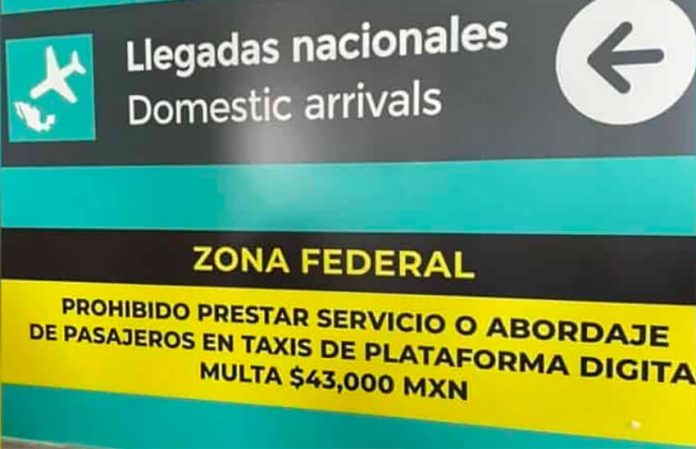Drivers for ride-hailing apps such as Uber are defying a ban on pick-ups and drop-offs at the Mexico City International Airport (AICM), a rule authorities are currently doing little to enforce.
A ban on dropping passengers off at the airport took effect last week, while a prohibition on collecting passengers was already in place. The latter ban has long been ignored by drivers for companies such as Uber and Didi, and they are now also disregarding the former.
Signs warning passengers and drivers about the bans appeared at the AICM last week, but they are doing little to deter users of ride-hailing apps. Despite the erection of the signs – a move praised by taxi drivers – it’s business as usual with regard to the arrival and departure of private ride-hailing vehicles, the newspaper El País reported Tuesday.
“The app drivers continue dropping off and collecting passengers without interference from the police,” reported a journalist who visited the airport. “… A police officer … says he hasn’t received instructions to fine anyone. Another airport employee confirms the lack of instructions.”
Ride-hailing app driver Luis Alberto Pérez told El País he thought twice about accepting a trip to the airport because he heard about a crackdown last week. Drivers flouting the ban face fines of up to 43,000 pesos (US $2,130) and a person Pérez knows was threatened with that penalty while at the AICM last week.
“It’s excessive. We don’t even earn that much in a month,” the 52-year-old driver said as he took the El País journalist to the airport. “I don’t know if the application provides support for those kinds of situations. I’ll investigate,” Pérez said.
Any lingering doubts drivers had about going to the airport appear to have been largely alleviated by the lack of enforcement this week. Pérez predicted that people will continue to use apps to book trips to and from the AICM and drivers will meet the demand they generate. “The airport taxis are really expensive, almost double what we charge,” he added.
Mayra Moya, a 33-year-old soccer referee, flew into the AICM for a holiday in the capital and used her phone to book a trip shortly after leaving the terminal building. When alerted to the new signs by El País, Moya remarked that “the prohibition is on the signs only.”
She described the ban as stupid, asserting that it doesn’t consider the needs of airport users, especially women who feel safer traveling in private ride-hailing vehicles because they can digitally share the details of their trips with family or friends.
“We have the right to choose the means of transport [we use] because we pay for it,” Moya said.
Víctor Acevedo, who flew in from Zacatecas with his family, told El País he understood taxi drivers’ concerns about ride-hailing apps “because they pay the airport” for the right to use its taxi stands. However, his family chooses to travel by Uber rather than traditional taxis. “Uber’s service is better,” said Marcela Reyes, Acevedo’s wife, shortly before they loaded their suitcases into their driver’s car.
While drivers for companies such as Uber and Didi are still providing service to and from the AICM, taxi drivers do appear to have benefited from the broadening of the ban and the efforts to make passengers aware of it. A taxi ticket saleswoman told El País that demand for trips departing the airport has increased 30% since the new signs appeared. However, demand is still down compared to five years ago when Zaira Morales sold some 100 trips per day. Now she’s lucky to sell 50.
The lower demand means taxi drivers – who have staged protests against ride-hailing companies – have to wait longer for a fare. Wait times have recently been almost an hour, up from 30 minutes in busier times, El País said.
Arturo Arellano, a taxi driver, told the newspaper that the ride-hailing apps are “in fashion, but noted that they are not authorized to provide services to and from the airport. Unsurprisingly, he is happy about the implementation of the broader ban and the installation of the signs.
“There you go,” Arellano quipped after loading a tourist’s luggage into his vehicle. “When there are fewer app vehicles, we have work.”
With reports from El País
